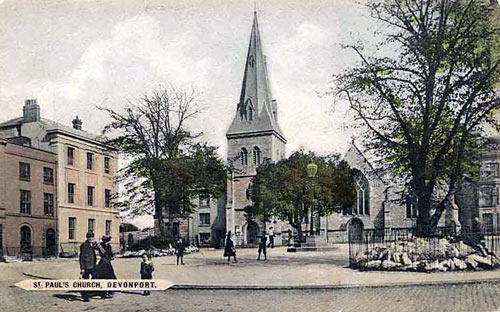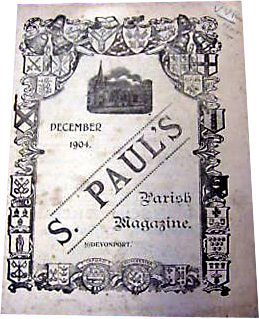St Paul's Church
St Paul's Church was located at the northern end of Morice Street, facing Morice Square from the east; on the spot where it once stood there is now parking for a row of cars.
St Paul's parish was formed in 1846, out of the mother parish of Stoke Damerel;
the foundation stone for the church was laid three years later, in July 1849.
Below is an early 20th century postcard of Morice Square and St Paul's
Church. The three-story building at left is the Fleet Club, still standing at time of writing, 2011.
The church was designed by James Piers St Aubyn.
According to Kelly's Directory of 1910 [1], the church .... 'is a building
of stone, in the Middle Pointed style, consisting of chancel, nave and aisles and
a tower containing one bell: the chancel comprises two bays, and is separated from
the aisles by a low screen; there are 600 sittings. The register dates from the
year 1851. The living is a vicarage, net yearly value £310, with residence, in the
gift of trustees, and held since 1890 by the Rev. Andrew John Hamlyn, who is also
a surrogate and chaplain to Royal Albert Hospital.'

The parish of St Paul's served the nearby community of North Corner; the congregation
attending from Cornwall Street, Cannon Street, Queen Street, King Street, Ordnance
Street and Morice Street.
St Paul's Church was severely damaged in the bombing of WWII; the skeleton structure
that remained was used as a playground by local children for many years after [2]. The
building was eventually demolished in 1958.
St Paul's Parish
In addition to the church proper, the parish constructed two community buildings,
both at North Corner. The first, designed by James Piers St Aubyn, was the 1860
building that had started out as St Paul's Parochial School but eventually became
Cornwall Street Girls' School. The second was the Mission Hall, constructed
in Cornwall Street Ope in 1883. The mission was used initially as a Sunday School, but following WWII it began being used for a variety of community
activities. In 1983 it took the name of The Armada Centre and was
formally opened by Princess Anne as a community centre. The Armada Centre was demolished in 2000 as part
of the North Corner rebuild.
Following the church's demolition in 1958 the parish of St Paul's was absorbed within the parish of St Aubyn.
For those researching baptisms, marriages, etc, Plymouth Record Office holds some of the registers.
St Paul’s Parish Magazine. December 1904

The following names and details have been transcribed from the above 1904 parish magazine. [3]
Parish Church
Vicar – Rev. A. J. Hamlyn, S. Paul’s Vicarage, Surrogate for Marriage Licences Chaplain of Royal Albert Hospital
Curate – Rev
Licenced Lay Reader – Mr F. W. Russs 18 Camperdown Street
Verger – Mr. Milford, 22 Morice Street
Church Caretaker – Mrs. Ware, 5 Morice Street
Mission Room Caretaker – Mr. Ford, 1 Cannon Street
St Paul’s Temperance Society Secretary – Mr. Whenmouth
St Paul’s Temperance Society Treasurer – Mr. Francombe
Band of Hope, Secretary & Treasurer – Mr. Whenmouth
Churchwarden
Mr. A.F.N. Goodman, LL.B., 41 Fore Street
Mr H. G. Cole, 100 Fore Street
Sidesmen
Mr. Broderick
Mr. Cobb
Mr. Screech
Mr. S. Cole
Mr. Francombe
Mr. Shears
Mr. Whenmouth
Mr. Ford
Mr. Halse
Mr. Holmes
Mr. Kendall
Mr. A. H. Oliver
Representatives of Congregation at Ruridecanal Conferences
Mr. Coward
Mr. T. Smith
Mr. Browning
The Choir
Organist and Choirmaster
Mr. Brand, 14 Queen’s Gate, Victoria Park
Ladies
Miss Brand
Miss Egg
Miss Mallet
Miss L. Mildren
Miss Rickard
Miss D. Thomas
Altos
Miss J. Brand
Miss Weakes
Boys
A. Behennah
S. Cole
W. Collins
H. Collins
G. H. Cretch
R. Egg
C. Evans
J. Hendrey
A. Hendry
C. Towlson
F..J. Williams
J. Mildren
Tenors
Mr. Cox
Mr. Coward
Mr. McHardy
Mr. Maddock
Mr. S. Mildren
Mr. R. Thomas
Mr. J. Thomas
Mr. T. Reed
Mr. Riggs
Mr. Wood
Basses
Mr. M. Bray
Mr. M. Francombe
Mr. Kervin
Mr. Pearne
Mr. H. C. Prouse
Mr. G. Rickard
Mr. Salt
Mr. Warren. (Now at Sea)
Sunday School Teachers
Superintendent – The Vicar
Senior Bible Class – Mr. Whenmouth
Boys' School
Mr. Behennah
Miss J. Brand
Miss Lowman
Mr. Rundle
Mr. Riggs
Mr. E. Screech
Mr. J. Smith
Mr. Voss
Girls’ school
Superintendent – Mrs. Hamlyn
Mrs. Bird
Miss Egg
Miss Goodman
Miss M. E. Mansell
Miss Pascoe
Miss Rahill
Miss L. Thomas
Infants’ School
Miss E. Ford
Miss Violet Smith
District Visitors and Magazine Distributors
Mrs. Blackler
Mrs. Cobb
Miss Rahill
Miss E. Mansell
Miss Shears
Mrs. Hamlyn
Miss K. Moor
Mrs. Ware
Mrs. Ritchie
Mrs Collings
Mission
Mother’s Meeting
Parochial Mission – Thursday 2.30, Mission Room
Lady Superintendent (pro term) Mrs. Hamlyn
Assistant Superintendent Mrs. Sennett
Mission Woman. Miss Kate Moon, 23 Morice St
Baptisms
October 26th
Olive Amelia, daughter of Charles Williams and Mary Elizabeth Dew.
Elsie Jemimam daughter of Peter and Ellen Murry.
Alice Maud Susan, daughter of William Artheru and Eliza Shean.
Bessie, daughter of William and Elizabeth Jane Lindley
October 27th
Hilda, daughter of Henry and Emma Jane Shaxon.
November 2nd
John Richard, son of George Frederick and Mary Anne Jones.
Mabel Elizabeth and Thomas George, children of William George and Elizabeth Jane Niles
November 9th
Richard George, son of Richard George and Catherine Sergeant
Lilian Gladys, daughter of Samuel Bassett Ellis and Rose Kate Dyer.
William Arther, son of William Newman and Amelia Elizabeth Tucker.
Harry Sampson Milford, son of William Henry and Mary Ann Trout.
Alfred Edward Samuel and Lilian Mary Elizabeth, children of Alfred Edward and Louisa Herring.
November 15th
Margaret Louisa, daughter of Charles Henry and Margaret Jane Kaboon.
November 23rd
William Ronald, son of Williamd and Florence Eliza Kellow.
Ernest Norman, son of Sidney and Amy Emma Denley.
Marriages
October 30th
William Williams and Mary Jane Willis
November 11th
Samuel John Ellender and Bertha Gould.
References:
[1] Kellys Directory of Devonshire 1910
[2] The author and her brothers and sisters were some of those children. Following
WWII, until the early 1960s, Devonport had numerous 'bomb sites' where local
children played. It was a common activity. Life was of a different time/culture then, parents never minded this activity,
neither did they chastise their children for playing on the ruins.
[3] The December 1904 parish magazine published by the church, transcribed by the author in 2010.
(page added 11 April 2011)